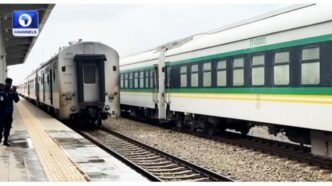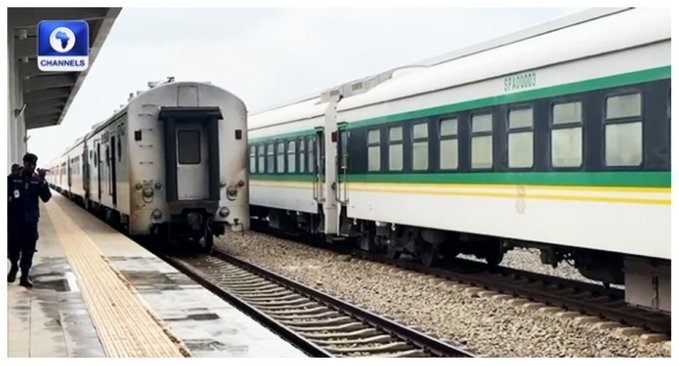The Nigerian Railway Corporation (NRC) has announced that train services along the Abuja–Kaduna corridor will resume next week, marking the end of another period of suspension that left thousands of commuters stranded and forced many back to the high-risk highway.
This announcement is expected to bring relief to business travelers, government officials, students, and traders who rely on the route for safe and efficient travel between the Federal Capital Territory (FCT) and Kaduna State.
NRC Confirms Resumption
Speaking to journalists in Abuja, the Managing Director of the NRC confirmed that all necessary repairs and safety checks have been completed to ensure the smooth return of operations. He emphasized that the Corporation has addressed technical issues and reinforced security arrangements in collaboration with law enforcement agencies.
According to him, “Our goal is not just to restart the Abuja–Kaduna train service but to ensure that passengers can travel with confidence. We have worked closely with security agencies, engineers, and our operations team to make sure that every aspect of the service is ready.”
The exact date for the resumption is expected to be announced within the coming days, but NRC sources said that services will kick off before the end of next week.
Background of Suspensions
The Abuja–Kaduna train service has experienced several interruptions since its inauguration in 2016. While the rail line initially became popular as a safer alternative to the Abuja–Kaduna expressway—infamous for kidnapping and bandit attacks—it has not been immune to its own security challenges.
In March 2022, the train service was suspended following a deadly terrorist attack that left passengers dead, injured, and dozens abducted. The tragedy shook the nation and forced a complete overhaul of security measures. Since then, operations have resumed intermittently but have also faced suspensions due to technical faults, maintenance works, and occasional security alerts.
The latest suspension, according to NRC, was necessitated by maintenance and safety audits. The Corporation insisted that the move was precautionary and necessary to guarantee passenger safety.
Passengers React to the News
The announcement has triggered mixed reactions from passengers who had been forced to either cancel their travel plans or risk the Abuja–Kaduna highway during the suspension.
A student of Kaduna State University, who frequently travels to Abuja, expressed relief at the development. “The highway is just too dangerous. Every time I go by road, my parents worry. The train is our only safe option. I am happy it’s coming back,” she said.
Traders also noted that the suspension negatively affected their businesses. Many said the train allowed them to move goods safely between Abuja and Kaduna without fear of robbery or abduction.
Security and Safety Measures
Security has been the central concern of Nigerians when it comes to the Abuja–Kaduna rail corridor. The NRC has repeatedly assured the public that collaboration with the Nigerian Police, Nigerian Army, and the Department of State Services (DSS) has significantly improved security on the trains.
According to insiders, security operatives will once again be deployed on each train trip, while surveillance technology and monitoring systems will be enhanced. NRC also revealed that the corporation has strengthened passenger screening procedures at terminals to prevent unauthorized items from entering the train.
In addition, plans are underway to integrate new ticketing technologies that will reduce cases of racketeering and impersonation, ensuring that only genuine passengers gain access to the trains.
Economic Impact of the Suspension
Transportation experts say that every suspension of the Abuja–Kaduna train service has significant economic consequences. Thousands of passengers rely on the train for business activities, official duties, and family visits.
“Every time the service is suspended, there is a chain reaction that affects commerce between Abuja and Kaduna. Traders, civil servants, contractors, and even students are all impacted. The suspension forces many to either delay travel or take risks on the highway. This resumption will help stabilize the corridor again,” a transport analyst explained.
The Train as a Symbol of National Infrastructure
The Abuja–Kaduna railway line was commissioned in 2016 as the first standard-gauge railway line in Nigeria’s modern rail modernization project. It was celebrated as a milestone achievement, reducing travel time between Abuja and Kaduna to less than two hours.
The train quickly became the preferred choice for thousands of Nigerians, not only because of its speed and affordability but also as a safer alternative to the highway. For many, the train is more than a means of transportation—it symbolizes Nigeria’s potential to modernize and provide secure, efficient public infrastructure.
However, repeated interruptions have sparked debates about Nigeria’s ability to protect its investments in infrastructure and ensure consistent service delivery.
Calls for Sustainability and Expansion
While many Nigerians are relieved about the resumption, some civil society groups and analysts are calling for broader reforms. They argue that the government must do more than temporarily suspend services each time a crisis arises.
According to one transport policy expert, “We cannot afford to run the Abuja–Kaduna line like a seasonal service. There needs to be a sustainable security framework, better investment in maintenance, and expansion to other routes. Nigerians deserve to travel without fear.”
Already, discussions are ongoing about extending train services beyond Kaduna, linking more cities across the North, and eventually connecting with the Lagos–Ibadan and Warri–Itakpe lines to build a stronger national railway grid.
What Passengers Should Expect Next Week
When the Abuja–Kaduna train resumes operations next week, passengers can expect adjusted schedules and a gradual ramp-up of services. NRC officials hinted that initial trips may be limited in number before full service resumes.
Fares are also expected to remain stable, at least in the immediate term, though NRC has not ruled out adjustments in the future due to rising operational costs. Passengers are advised to purchase tickets early and comply with new security protocols at terminals.
Looking Ahead
The return of the Abuja–Kaduna train is more than just the reopening of a transport service—it is a critical step toward restoring confidence in Nigeria’s infrastructure and security systems.
For many, the train is not just about travel convenience; it represents safety, economic stability, and a lifeline that connects two major regions of the country.
As NRC prepares to relaunch the service next week, the focus will be on whether the Corporation can deliver consistent, safe, and reliable operations. Nigerians are hopeful, but they remain cautious, knowing that the Abuja–Kaduna rail line has faced multiple challenges before.
What is clear is that the nation will be watching closely. For commuters, the return of the train means a return to relative safety, and for the NRC, it is another opportunity to prove that Nigeria’s railway modernization project can live up to its promise.
Conclusion
The resumption of the Abuja–Kaduna train service next week is welcome news for Nigerians who have endured weeks of uncertainty. While challenges remain, the announcement underscores the importance of rail transport in Nigeria’s national development.
If the NRC can sustain operations, enforce security, and maintain infrastructure effectively, the Abuja–Kaduna rail line could once again become a model for other parts of the country. For now, passengers and stakeholders alike are preparing for the long-awaited reopening, hopeful that this time, the service will endure without further interruptions.














